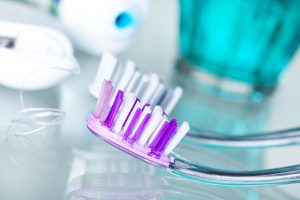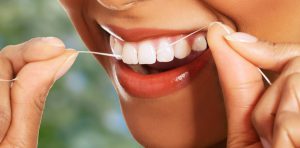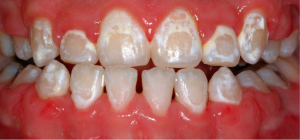Brushing & Braces: Building Good Oral Hygiene Habits
We’ve all heard the joke: “You don’t have to brush your teeth, just the ones you want to keep.” Dental humor aside, it points out the importance of good oral hygiene. You may even have it framed in a bathroom for your entire household to see or seen it posted at your dentist’s office. That’s because proper oral care should be an important part of everyone’s daily routine. It’s not only a critical component in avoiding some common dental problems like tooth decay and gum disease, but it’s also a way to protect your overall health. Poor oral hygiene can create a bacterial breeding ground leading to serious health problems in the rest of the body. Research even suggests that gum disease is associated with an increased risk of developing heart disease!
Studies have shown that gum disease can increase your risk of heart disease and stroke!
Our team at Berkman & Shapiro Orthodontics knows that caring for your teeth can be challenging when you have braces, so we’ve put together a guide to achieving and maintaining great oral hygiene during orthodontic treatment.
A Step By Step Guide To Brushing And Flossing With Braces

Cleaning your teeth properly is a super important aspect of oral health, especially while wearing braces. We recommend that brushing your teeth thoroughly two to three times a day with fluoride toothpaste, making sure to pay special attention to the areas between the wires and your teeth, and also between the brackets and gums. (Doing this after every meal to clear any food debris that may have become trapped in or around your braces will certainly help you maintain great oral health and prevent premature decay!)
When brushing with braces, make sure to brush for at least two minutes each time, placing the tips of the bristles flat against your teeth and gently clean using small circular motions. Then move to the areas between the gums and the braces, tilting the brush toward the gum line while continuing the circular motions. Next up are the chewing surfaces of the upper and lower teeth, gliding the bristles in a firm back-and-forth motion to clean those areas. Lastly, brush the inside surfaces of the teeth using those same small circular motions. If you prefer a different order, that’s fine as long as you thoroughly clean all the areas mentioned.
Pro tips:
- Use a soft orthodontic toothbrush. These are ones that have longer bristles on the edges and shorter ones in the middle, to really help you clean in between your braces and your teeth.
- If you’re using an electric toothbrush, use one with a soft bristled head. If it has an adjustable speed, use a more moderate setting, so you don’t accidentally break or loosen any part of your braces.
- Another option is an interdental brush, which fits in between the wires and the teeth to remove hard-to-reach plaque and food debris.
- A mouthwash containing fluoride is a good accompaniment to regular brushing and flossing because it helps strengthen the enamel on your teeth preventing tooth decay during orthodontic treatment.
- Regular dental visits are important to monitor the health of your teeth and gums during orthodontic treatment. Aim for twice-a-year checkups and cleanings.

Along with brushing, flossing is an integral part of keeping your teeth healthy. Flossing should be done at least once per day, and preferably each time you brush. Flossing regularly is crucial for someone wearing braces because it’s simple for food particles to get stuck in the tiny crevices around the brackets and even in your gums. You may think it’s impossible to floss while wearing braces, but fortunately, there are several ways to accomplish this effectively.
You should begin by finding some waxed dental floss. Unwaxed floss can sometimes get caught on brackets and shred, leading to an annoying clean-up process. Snap off a thread of about 18 inches or so, place it between the teeth, being careful around your wire, and gently move it up and down. Careful movements will prevent snapping, discomfort, and bending of your wire.
A floss threader is a tool designed to help make flossing with braces easier. A little like a threading needle, you simply pull one end of the floss through the threader, feed the threader under the archwire, grab the floss on each end, and slide it up and down the sides of both teeth and under the gums. Hear a squeaking sound? Pull the threader out and move on to the next section of teeth.
If regular floss isn’t your style, Oral irrigators, like a Waterpik, are instruments that can shoot small, high-pressure streams of water onto the teeth, removing food debris and plaque from between your teeth and braces and can help get something unstuck. If you’ve got braces, your orthodontist will have told you to avoid certain foods.
What NOT To Do And Why
If you’ve got braces, your orthodontist will have told you to avoid certain foods. You may have heard our lead orthodontic assistant, Chelsea, say the phrase “ Nothing sticky, chewy, crunchy or hard” when a patient is getting braces put on. These types of foods can risk loosening bands and bending wires, as well as actually breaking your braces. While Sticky foods can easily get caught in wires and brackets, leading to hard-to-remove build-up.
Chelsea and our team of assistants recommend avoiding:
- Chunky granola or protein bars
- Popcorn with kernels
- Raw apples & carrots
- Nuts
- Caramel
- Gummy candy
- Tootsie rolls and starbursts
As well as acidic items, like
- Sour fruits
- Pop
- Vinegar
- lemon Juice
- Coffee
- Energy drinks
These can stain your teeth, as well as damage tooth enamel over time. Additionally, sugary foods and drinks in large quantities should be avoided since it’s difficult to clean the teeth under the braces and can lead to a buildup of more plaque since it essentially feeds the current bacteria in your mouth. Eating risky foods can damage your braces, meaning you’ll have to take time out of your day to have repairs done. In addition, it might prolong your orthodontic treatment. Avoid the hassle by cutting these kinds of food during treatment, or only eating them after receiving our approval.

Neglecting your oral health can cause real long-term damage. Poor Oral health can lead to decalcification of enamel – or scarring – on your teeth ( YIKES!) and elongate treatment by forcing your orthodontist to remove braces prematurely and let your teeth heal. Not brushing and flossing can also lead to open sores (that can get infected by the bacteria that lives in your mouth – YUCK!), gum disease, on top of extended treatment length.
Cleaning your teeth properly is an essential aspect of oral health, especially while wearing braces. Berkman & Shapiro want to help you achieve that great-looking smile you’ve dreamed of and keep it for years to come. Our skilled staff strives to consistently provide outstanding personalized service to each and every patient. If you would like to learn more or just have general orthodontic questions, we’d be happy to talk with you in our state-of-the-art facility.
Schedule your free consultation or give our office a call at 248.360.7878. We hope to see you soon!





